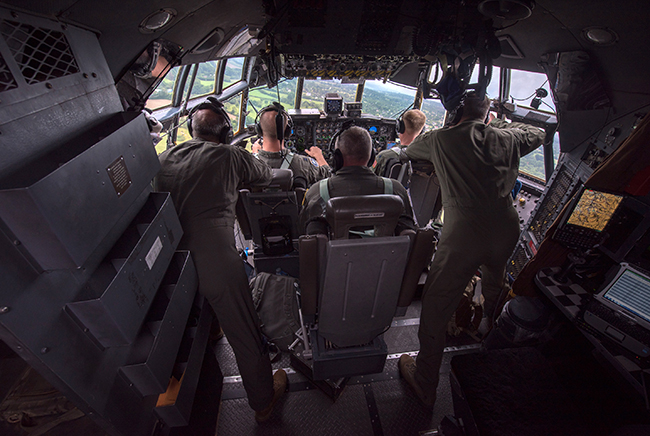
An aircrew from the 165th Airlift Squadron flies over the skies of Normandy, France, aboard a Kentucky Air National Guard C-130 on June 4, 2019. Air National Guard photo by Phil Speck.
Air Mobility Command is expanding how it trains its aircrews to operate in contested environments by going beyond regular exercises and challenging airmen at random in daily operations.
“The days of operating with impunity are over,” AMC boss Gen. Maryanne Miller said in prepared remarks at the Airlift/Tanker Association conference in Orlando, Fla., earlier this month. “We must be ready to compete at any level to project such strength that we deter our adversaries from conflict.”
To do that, Miller is asking her command to consider potential scenarios they could encounter.
“What if your orders are spoofed and you land at the wrong base with a critically wounded patient” she asked. “What if you are a contingency response team, at the edge of hostile territory, and you lose comms? What if satellites are jammed — are you confident in alternate navigation procedures”
“These scenarios are real in today’s environment,” Miller said. “We must be prepared.”
Preparing to operate in denied environments is spreading further into AMC’s regular training. For example, at last month’s Mobility Guardian exercise in Washington state, aircrews simulated losing radio communications and instead used runners to transmit information. Airmen needed to understand a commander’s intent for missions so they could complete their objectives, but were cut off from radio contact while in the air.
But the requirement goes beyond command-wide exercises, Miller said, as each wing grows its focus on challenged areas. Major mobility wings, such as JB Lewis-McChord’s 62nd Airlift Wing and the 437th Airlift Wing at JB Charleston, S.C., are integrating those concepts deeper into their respective major training events, the Rainier Wars and Palmetto Challenge.
At the same time, AMC headquarters is randomly putting crews across the command through a challenge with its 618th Air Operations Center, the Tanker Airlift Control Center. The center is in charge of receiving US Transportation Command requests for air mobility support, then tasking the appropriate unit.
Using the element of surprise, the TACC selects crews who are forced to plan flights by hand. Those airmen must work through the logistics of their upcoming mission without the aid of networked computers.
The isolation “drives them nuts,” Miller said.

